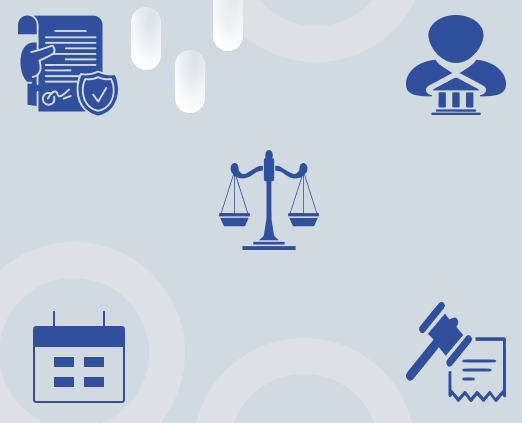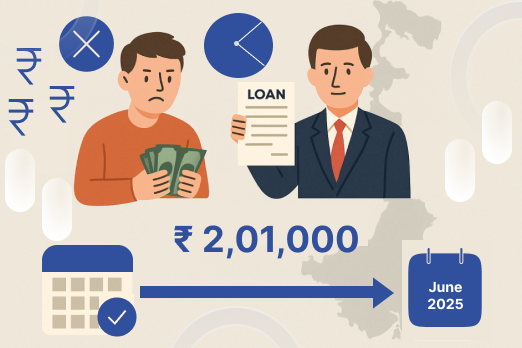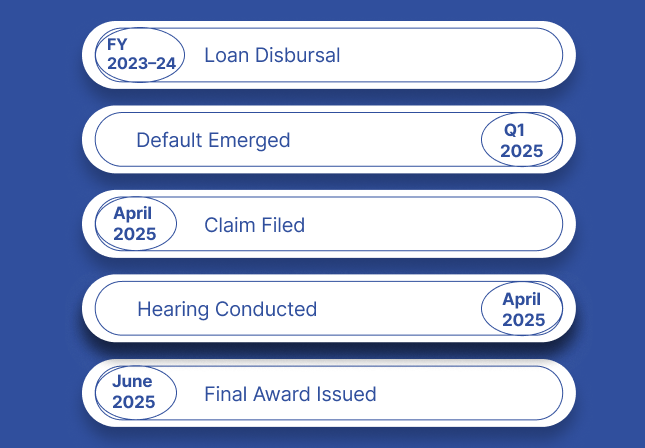Introduction
In India’s fast-growing digital lending ecosystem, micro and small business borrowers can easily access credit, but the risk of loan defaults remains a pressing concern. In this case, a business loan of Rs. 2,01,509 defaulted soon after disbursal, with the borrower becoming entirely unresponsive. PrivateCourt, through its neutral ADR facilitation, enabled an efficient and lawful ex-parte resolution that ensured recovery protection for the lender. The award, passed after procedural compliance, once again reinforced the strength of structured digital dispute resolution.

Dispute Snapshot
The respondent had received the loan under a standard agreement that included a legally binding arbitration clause. The disbursal was smooth, and the funds were likely used for short-term working capital needs. However, the borrower failed to maintain repayment discipline and did not respond to repeated communications, including formal notices. With Rs. 2,01,509 in dues, the lender invoked the dispute resolution clause and approached PrivateCourt for facilitation. The respondent's continued silence throughout the process triggered an ex-parte arbitration.

The Journey to Default
Based on the borrower profile, it is likely that the individual operated a neighborhood business, possibly in general trading or local services. These businesses often rely heavily on short cash cycles. Any external market disruptions or inventory delays may have severely impacted the borrower’s repayment capacity. Despite formal attempts to reconnect, the borrower failed to acknowledge the claim or participate in any discussion. With all informal options exhausted, the lender opted for PrivateCourt’s digital ADR route. The absence of the borrower led to a hearing conducted solely on the strength of the claimant’s documentation.

Timeline of Key Events
| Date | Event |
|---|---|
| FY 2023–24 | Loan Disbursal |
| Q1 2025 | Default Emerged |
| 02 April 2025 | Claim Filed |
| 14 April 2025 | Hearing Conducted |
| 19 June 2025 | Final Award Issued |

Documentation and Submissions
The following documents were submitted by the claimant:
- Executed loan agreement with arbitration clause
- Claim statement and affidavit
- Loan account and EMI default summary
- Copies of legal notices and delivery tracking
- Authorization letter for the claimant representative
- Summary of non-responsive communication logs

The ADR Process Facilitated by PrivateCourt
PrivateCourt’s arbitration facilitation commenced under the provisions of the Arbitration and Conciliation Act, 1996. A neutral arbitrator was appointed, and hearing dates were set with notice sent to the respondent. The borrower, despite repeated notifications, failed to participate. The arbitrator assessed the claim based on all submitted records and found the claim justified. The ex-parte award was passed digitally and archived through PrivateCourt’s secure platform. This process ensured complete legal validity and provided the claimant with an enforceable outcome.

Final Award (Dated: 19 June 2025)
- Outstanding Loan Amount: Rs. 2,01,509/-
- Interest Awarded: @18% p.a. from 14/04/2025 until realization
- Arbitration Fees: Rs. 1,500 to be paid by respondent
- Award Status: Ex-Parte, enforceable
Final Insights
This case is yet another demonstration of how ex-parte arbitration under PrivateCourt’s facilitation delivers clarity and closure, even in borrower-absent scenarios. Through careful adherence to procedure, legal backing, and digital case handling, PrivateCourt ensured that the lender’s rights were upheld without resorting to court litigation. For digital credit providers, it highlights the vital role of neutral ADR in de-risking lending operations.
keywords: Loan Default, PrivateCourt, Arbitration, ADR, Ex-Parte Award, Small Business Loan, Digital Recovery
